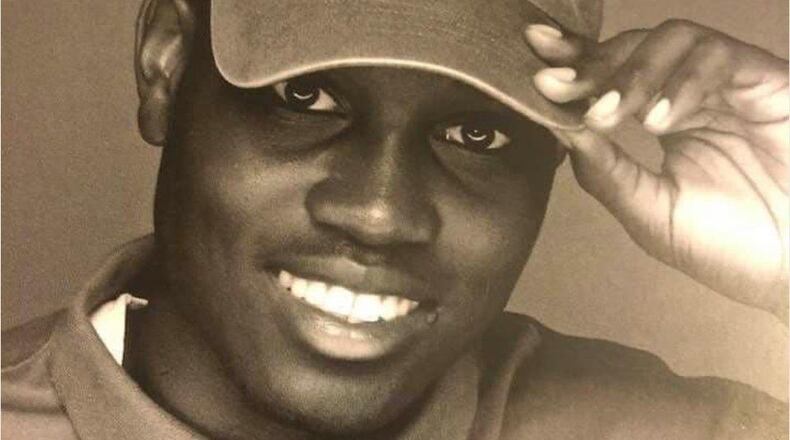A trial date for the three men charged with the murder of Ahmaud Arbery has finally been set. And a hearing this week could determine if defense lawyers can essentially put the slain Arbery on trial when the case goes before a jury.
Judge Timothy Walmsley is being asked to allow details of Arbery’s past scrapes with law enforcement to be put into evidence. Walmsley must also decide whether Arbery’s mental illness is relevant to the defendants’ claims of self-defense. The judge, who has set an Oct. 18 trial date, will consider the requests during hearings Wednesday and Thursday.
If Walmsley allows the evidence, it will be an enormous victory for the defense and completely change the nature of the trial. As expected, prosecutors strongly oppose it.
”Murder is illegal whether the victim regularly served breakfast to the homeless at his church, or regularly stole cars, or did both,” the state said in a court filing. “The victim’s prior crimes or other acts involving third parties do not excuse or mitigate his murder and are generally not relevant to any issue at trial.”
Former Gwinnett County District Attorney Danny Porter said he does not expect Walmsley to grant the request because the defendants knew nothing about Arbery’s past when they confronted him. “I think it’s a shot in the dark by the defense, but if they succeed it’s going to complicate the prosecution’s job,” he said.
The motions were filed by lawyers representing Travis McMichael and his father, Greg McMichael.
On Feb. 23, 2020, Greg McMichael saw Arbery running down the street in the Satilla Shores neighborhood near Brunswick. Security camera video from a house under construction and owned by Larry English showed Arbery enter the home before he ran down the street.
McMichael, in his front yard, called to his son and they got their guns, jumped into a truck and sped after Arbery. A neighbor, Roddie Bryan, soon joined in the chase in his pickup.
When the men, who are white, had Arbery hemmed in, Arbery lunged at Travis McMichael, who had gotten out of his truck with his shotgun. McMichael killed the unarmed Arbery, who was Black, with three blasts.
The McMichaels and Bryan were later indicted for murder and denied bond.
The three men say they were making a citizen’s arrest. Under then-Georgia law, private citizens could detain someone if they had reasonable suspicion the person had committed a felony and was trying to escape.
State prosecutors say the McMichaels and Bryan had no reason to believe that because Arbery was never seen taking anything from inside a home. They suggest a racist motive was behind the killing because Bryan told GBI agents that he heard Travis McMichael say, “(expletive) N-word,” as he stood over the dying Arbery.
In motions, the McMichaels’ lawyers cite 10 prior “bad acts” committed by Arbery from 2013 to the weeks leading up to his killing. These include two guilty pleas — one for trying to take a handgun inside a gym, another for shoplifting — and other confrontations Arbery had with police.
In an interview, Bob Rubin, one of Travis McMichael’s lawyers, acknowledged the defendants did not know about Arbery’s past. “But it gives a jury an understanding of what Ahmaud Arbery is doing at Larry English’s house,” he said.
Arbery, Rubin said, was committing a burglary.
“Burglary is a felony,” he said. “Burglary is entering a dwelling without authority, and a house under construction is a dwelling, with the intent to commit a felony or a theft. It doesn’t mean you ever take anything. It’s the intent to commit a felony or a theft that makes it a burglary.”
Rubin’s co-counsel, Jason Sheffield, said Arbery’s mental illness is also relevant. In 2018, Arbery was diagnosed with schizoeffective disorder. He told doctors he had delusions that sometimes commanded him to rob and hurt people.
Credit: Jenni Girtman
Credit: Jenni Girtman
The motion said Arbery was prescribed medication but had stopped taking it. Arbery’s mother, Wanda Cooper-Jones, has said her son went for runs as a way of self-medicating and was doing so the day he died.
Still, body camera footage shows Arbery getting angry with quick upswings of aggression during his interactions with police, Sheffield said.
The issue of mental illness
As for the McMichaels, Sheffield argued that they were not the aggressors. “They were just asking him why he was there. And at that moment where he has that switch and he has that break, he decides impulsively to go for the gun, then that is, we think, related to his mental illness.”
At a probable cause hearing last year, GBI agent Richard Dial testified that Arbery had been pursued to a point where he could not run anymore. “And it was turning his back to a man with a shotgun or fight with his bare hands,” Dial said of Arbery. “He chose to fight.”
Sheffield said people should not assume Arbery was frightened out of his mind before he died. “He may have been literally out of his mind at that time,” he said.
“The jury has the right to try to understand why he was acting that way and if he was the first aggressor,” Sheffield said, insisting the defense is not trying to trash Arbery. “It’s the troubling, risk-taking behavior that I think underscores the mental illness. That’s why the mental illness is at the heart of this case, and it’s tragic he didn’t get the help that he needed.”
In a pointed response, prosecutors took issue with the defense’s request. Though mention of Arbery’s mental health struggles was not made until after the state issued its response to the defense motion, prosecutors said Arbery’s past is not admissible.
“Ahmaud Arbery’s character is not an essential element in any claim of justification nor relevant to any issue in this case,” the state’s motion said.
‘Citizen’s arrest’ not legitimate?
Cobb County prosecutors went on to say that evidence of a victim’s prior convictions is only admissible in court if the defendants were aware of them.
“The defendants did not know Mr. Arbery,” the state’s response said. “They had no prior relationship with him and knew nothing about the ten prior acts they now seek to admit.”
There was no evidence that Arbery had gone into the home under construction and committed a crime, the response said. Though he had entered the home on several occasions, surveillance footage never captured him taking anything from it, prosecutors said.
However, the response said, the McMichaels committed several crimes when they detained Arbery to confront him about going into the home.
“Assaulting and detaining Mr. Arbery at the point of a shotgun … constitutes the crimes of false imprisonment and aggravated assault,” the response said. “Attempting to strike Mr. Arbery with a pickup truck in order to detain him is aggravated assault. Thus, under the law, all the actions taken by the defendants were crimes and did not constitute a legitimate ‘citizen’s arrest.’”
To bolster their argument, prosecutors included a transcript from an interview Greg McMichael gave at the Glynn County Police Department shortly after the fatal shooting. According to the transcript, when an officer asked if Arbery was taking anything from the home, McMichael said he wasn’t sure.
“I don’t think the guy has actually stolen anything out of there, or if he did it was early on in the process, but he keeps going back over and over and over again to this damn house,” McMichael said.
Later, an agent once again asked McMichael if Arbery had broken into a house that day. “That’s just it, I don’t know,” McMichael replied.
What could be tricky during trial
The state said Arbery’s past is not relevant in determining if the McMichaels and Bryan acted reasonably, “since any such prior acts by Mr. Arbery did not escalate their fear of him or inform the defendants’ decision-making process to shoot him.”
The state ended its response with condemnation.
“The defendants seek solely to smear the victim and ask the jury to excuse the defendants’ behavior by saying: See, Arbery was a bad guy, it’s okay that they murdered him,” the response said.
Atlanta criminal defense lawyer Don Samuel, who is not involved in the case, said he doubts Walmsley will allow Arbery’s prior scrapes with the law into evidence.
“I think the defense probably really wants to get this evidence in for exactly the wrong reasons or exactly the impermissible reasons,” he said. “I think they know that the more evidence they can get in to show that Mr. Arbery wasn’t perfect, the better their chances are of winning or getting a hung jury.”
If the judge rules it out before trial, prosecutors could inadvertently open the door to it during trial. Such as if they put Arbery’s character into play with a witness testifying Arbery was never in trouble.
“If a witness says that, then the defense can certainly respond with a whole slew of evidence to show the witness was wrong,” Samuel said.
As for Arbery’s mental illness, that’s a tougher call, Samuel said.
If the defense can put up a convincing case that the McMichaels were making a lawful citizen’s arrest, then the question turns on who was the aggressor in the moments before Arbery was shot and killed, Samuel said. The defense will argue it was Arbery and say when he lunged at Travis McMichael to try and take away his shotgun, McMichael had to use deadly force to prevent that.
“It’s in that context, that small slice of time, that I think evidence of his prior conduct is relevant to show that (Arbery) was the aggressor,” Samuel said.
But if the McMichaels cannot show they were making a lawful citizen’s arrest, it’s pretty much game over, Samuel said. “If they’re the initial aggressors, they can’t claim self-defense at all.”
ABOUT THIS STORY
This story contains sensitive information about Ahmaud Arbery’s past, including accusations about his conduct in incidents where he was never officially charged.
The Atlanta Journal-Constitution is publishing this information in limited format because it is essential to understanding the debate over whether the material should be admissible in the trial of those accused in Arbery’s shooting death.
In the murder case against Travis McMichael, Greg McMichael and Roddie Bryan, their lawyers say the admission of this evidence is critical to their defense.
Prosecutors say it has no relevance and should be excluded. The arguments are laid out in public motions and will be the focus of court hearings this week.
THE STORY SO FAR
On Feb. 23, 2020, Ahmaud Arbery is shot and killed in a neighborhood outside of Brunswick.
On May 8, 2020, one day after getting into the case, the GBI charges father and son Greg and Travis McMichael with murder in Arbery’s death; Roddie Bryan is charged a week later.
On April 28, the U.S. Justice Department obtained a hate crimes indictment that accuses them of using force or the threat of force to intimidate Arbery because of his race.
On Wednesday and Thursday, Superior Court Judge Timothy Walmsley will preside over important pretrial motions hearings in the state murder case.
For more on the Arbery case, please listen to The Atlanta Journal-Constitution’s Breakdown podcast. Its eighth season is devoted to following the case.
Keep Reading
The Latest
Featured






